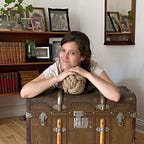Getting What We Deserve: The Time I Agreed with Sarah Silverman
“My shrink says we don’t get what we want, we get what we think we deserve.” — Sarah Silverman
“Getting what we think we deserve” could mean receiving what our hearts have been trained to expect or seeing what our minds are prepared to see. It’s said that when Native Americans first saw the British ships’ white sails for the first time, they saw them as “strange clouds.” (Who said this, Karin? Okay, I saw it in the Disney movie Pocahontas, but I’ve heard similar stories from more credible sources).
By definition, we can only receive what we believe it’s possible to receive, whether from God or from anyone else. Regardless of what we desire. I can receive the weather as much as I have opened my window, the sun as much as I have opened my blind. We cannot darken the sun, but we may choose to live in shadow if we don’t expect sunlight on the other side of the curtains we don’t bother to push aside.
One complaint I’ve heard leveled against Christianity is in the form of a question: “Why do I need to believe something specific?” Biblical admonitions to believe are called “nit-picky.” But believing is what it means to be changed. How can I be changed without changing my mind, and what is my mind made of if not beliefs?
We can’t experience something we don’t believe. When we are at risk of doing so, what we believe necessarily changes to accommodate a new reality. The theory of cognitive dissonance has observed that people automatically seek harmonious beliefs. We must make sense of what happens to us, including the contradictions.
The Pocahontas story illustrates that we can’t show others something their worldview isn’t ready to see. Many worldviews have only rounded edges and no corners, doors, or windows. When you’re born blind you don’t know what you’re missing or even that you’re missing anything. It’s not easy to imagine having another sense.
Believers and unbelievers can accuse one another of living in just such a claustrophobic, sealed-off place, unable to see outside it, needing everything to conform to the existing story. They’re both right. All humans do this by nature.
For example, I once sat through a “sermon” about a church plant. The pastor’s passion to reach more people seemed obvious to me, but my non-Christian pew-mate was mildly disgusted, convinced the pastor was scheming to provide for his own retirement with a steady circuit of speaking “gigs.” I struggled to understand the negative reaction until I realized he could not see God, only money. His worldview had to explain everything with no possibility of God’s work.
Take God out of that particular equation and all that’s left is the pastor’s selfish motivation to glorify himself, expand the church’s “brand,” and make money. The possibility of God moving the pastor’s heart to expansive action wasn’t on the table.
To use the blindness analogy, vision lets us see more than what we’re currently in direct contact with. We’re all in direct contact with money, but God is beyond us. How can a sightless person perceive new information if they will not see? By bumping right into it, a physical collision.
How does anyone get a bigger or different perspective if we naturally explain away new information by folding it into our existing beliefs?
God is in the business of transcending this gap between what is possible to us and what really is. Of getting us to open our window to the sun or sometimes opening it forcibly. Of teaching us to expect more and more through experiences that keep breaking the walls of what we think is possible or expectable from our lives. God makes direct contact.
Though I’m a Christian and believe the God of the Bible is the agent of this process, the term “life” can often be substituted. Life “breaks our boxes,” subverting our expectations in surprising ways. When life catches us off guard with something we don’t understand, we grow and our beliefs grow with us.
By the way, the gap (between what we can receive and what exists) can look like different things. Of course there are many gaps that have nothing to do with religion or spirituality, but most people have a gap between the details of their own life story and the concept “not only does God exist, but He delights in you just as you are.”
A deep, long-term relationship with God results in openness, which is a way of being mentally prepared for the unexpected, ready to adapt to new developments. An open person has more than likely experienced their expectations being flipped upside down and is thus more cautious about making concrete claims.
An old belief doesn’t go away without being replaced. If it’s time to reevaluate a belief, identifying alternatives is the first step, no matter how unlikely. Though we cannot make ourselves believe anything, if we are willing to change our minds we can begin by asking, “what if…?” Mentally trying on a concept is the first step after forming a question, the hypothesis in the scientific method. Guess and test. Apply and see if they hold water.
Someone once said we don’t get what we want, we get what we think we deserve. I’m not comfortable making claims about what we deserve; it’s semantics, but I don’t want to have or encourage an entitled attitude. Having said that, though, I believe all the best things in life (love, joy, peace, hope, etc.) are given to us freely and without measure. In the language of the quote, I think we deserve them. I certainly believe we can have them if we will receive them. And isn’t that what we want anyway?
Originally published at www.sailingbythestars.com on April 27, 2018.
